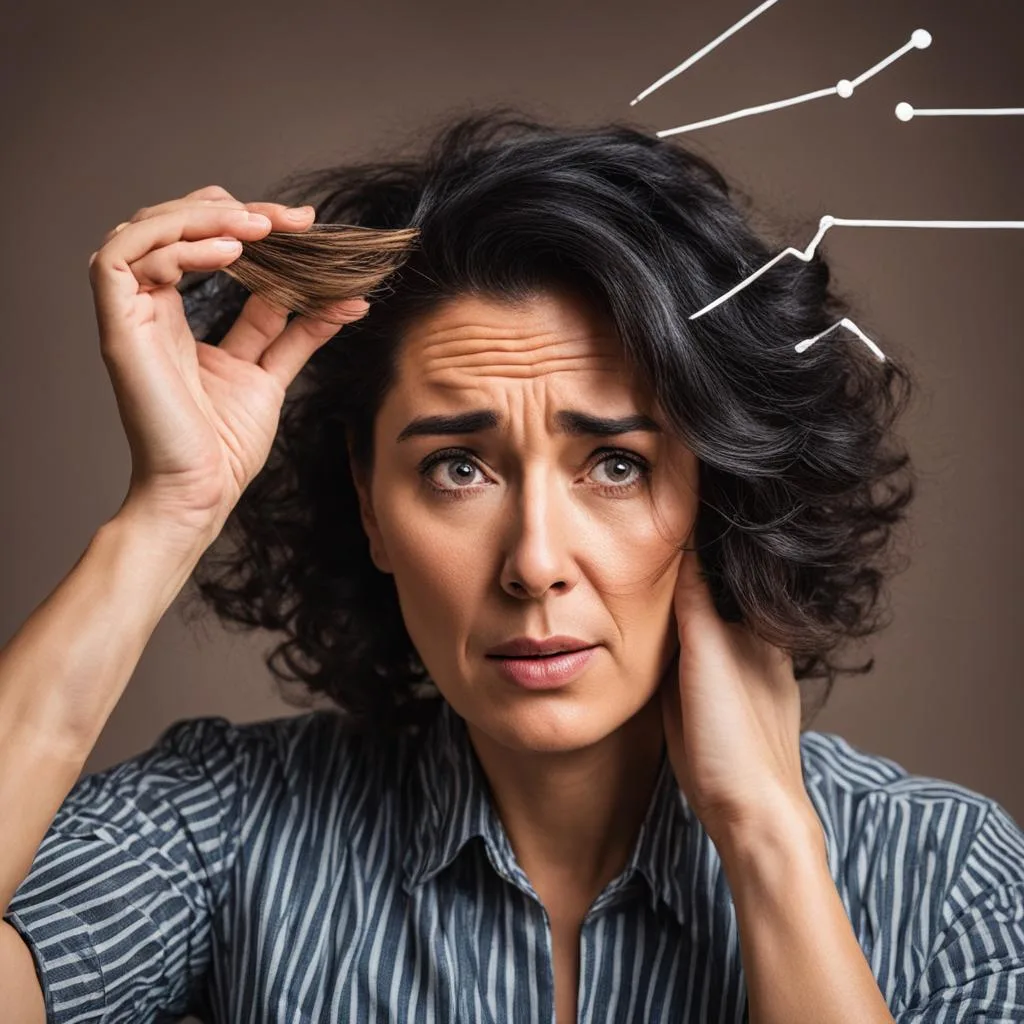Hair loss can be a distressing experience, and while many factors can contribute to it, hormonal imbalances are becoming increasingly recognized as one of the primary culprits. Hormones affect nearly every aspect of our wellbeing, and when they get out of balance, it can have a cascading effect on our bodies.
If you’ve noticed that your hair has been falling out more than usual, it’s possible that hormonal imbalances are to blame. In this section, we will discuss the five key indicators that may suggest you have hormonal hairfall. By understanding the symptoms and causes of hormonal hair loss, you can take proactive steps to prevent further hair fall and promote healthy growth.
Key Takeaways
- Hormonal imbalances are a common cause of hair loss.
- Hormonal hairfall can present differently in men and women.
- Excessive shedding, changes in hair texture, and receding hairline are some of the key symptoms of hormonal hairfall.
- Lifestyle factors, such as stress and diet, can contribute to hormonal imbalances and hair loss.
- Seeking professional help is essential in diagnosing and treating hormonal hairfall.
Understanding Hormones and Hair Loss
Hair fall is a common issue that affects millions of people worldwide. However, not all hair loss is the same. Some people experience hair loss due to hormonal imbalances, known as hormonal hair loss. In this section, we will explore the connection between hormones and hair loss in detail. By understanding the underlying mechanisms, we can gain insights into the causes of hormonal hairfall.
Hormonal imbalances can lead to hair fall in both women and men. In women, hormonal hair loss is commonly associated with conditions such as pregnancy, menopause, and polycystic ovary syndrome (PCOS), which affect hormone levels and can trigger hair loss. On the other hand, hormonal hair loss in men is typically caused by dihydrotestosterone (DHT), a hormone that affects hair follicles and can lead to hair thinning and baldness.
Hormones play a vital role in regulating various bodily functions, including hair growth. When hormones such as testosterone, estrogen, and thyroid hormones are imbalanced, this can disrupt the hair growth cycle and lead to hair fall. By identifying the hormonal imbalances causing hair loss, you can take proactive steps to manage and treat the issue.
“Hormonal imbalances can lead to hair fall in both men and women. In women, menopause, pregnancy, and polycystic ovary syndrome (PCOS) are the leading causes of hormonal hair loss. On the other hand, hormones like DHT are primarily responsible for hormonal hair loss in men.”
The Role of Androgens in Hormonal Hair Loss
Androgens, a group of hormones that includes testosterone and DHT, can have a significant impact on hair growth. In women with PCOS, excess androgens can lead to hair thinning and excess facial and body hair. Similarly, in men and women, high levels of DHT can shrink hair follicles and lead to male or female pattern baldness. By regulating androgens and hormone levels, it’s possible to minimize the impact of hormonal hair loss.
The Importance of Hormone Balance
Overall, hormonal imbalances can cause a range of issues, including hair loss. By prioritizing hormone balance through diet, exercise, stress management, and medical intervention when necessary, you can mitigate the effects and regain healthy, vibrant hair.
Common Causes of Hormonal Hairfall
Hormonal hairfall can be attributed to various factors, such as changes in hormone levels, underlying health conditions, and genetic predisposition.
Changes in hormone levels: Fluctuations in hormones, such as androgens and estrogens, can lead to hormonal imbalances that affect hair growth cycles. Higher levels of androgens, for instance, can shrink hair follicles and lead to hair thinning and loss.
Underlying health conditions: Certain medical conditions such as Polycystic Ovary Syndrome (PCOS), thyroid disorders, and autoimmune diseases can also contribute to hormonal hairfall. These conditions often affect hormone production or balance, leading to hair loss.
Genetic predisposition: The genes inherited from our parents can also play a role in hormonal hairfall. Androgenetic alopecia, for instance, is a hereditary condition that causes hair loss in both men and women due to the effects of androgen hormones on hair follicles.
Other causes of hormonal hairfall may include stress, poor nutrition, and certain medications. Proper diagnosis of the underlying cause is crucial for developing effective treatment plans.

Symptoms of Hormonal Hairfall
Identifying the symptoms of hormonal hair fall is crucial in taking proactive measures to address hair loss. Here are some of the signs to watch out for:
- Excessive shedding: If you notice a significant amount of hair falling off every time you comb or wash your hair, it could be a sign of hormonal hair fall.
- Thinning hair: Hormonal imbalances can cause hair to become thinner and less voluminous over time.
- Receding hairline: A receding hairline, especially in men, can be an indicator of hormonal hair fall.
- Changes in hair texture: Hormonal changes can also affect the texture and quality of your hair, making it drier or coarser.
By identifying these symptoms early on, you can take steps to address hormonal hair fall before it becomes more severe. Seeking the advice of a healthcare professional can aid you in identifying and managing hormonal hair loss. Check out the image below for a quick overview of the symptoms of hormonal hair fall.
| Hormonal Hairfall Symptoms |
|---|
Addressing Hormonal Hairfall: Prevention and Remedies
Hormonal imbalances can lead to hair fall, making it essential to take proactive measures to prevent and manage hormonal hairfall. By implementing the following remedies and prevention strategies, you can help regulate hormone levels and minimize hair loss.
Lifestyle Changes: Incorporating healthy habits into your daily routine can help reduce hormonal imbalances. Exercise regularly, get adequate sleep, and manage stress levels through relaxation techniques such as meditation or yoga.
Dietary Modifications: A well-balanced diet rich in essential nutrients can help maintain healthy hormone levels. Foods such as leafy greens, eggs, nuts, and fish are excellent for hair health.
Natural Remedies: Various natural remedies can help regulate hormone levels and promote hair growth. For instance, applying onion juice or coconut oil can nourish hair follicles and improve hair texture.

Hormonal Hair Fall Prevention Table:
| Hormonal Hair Fall Prevention Strategies | Benefits |
|---|---|
| Exercise | Reduces stress and balances hormones |
| Healthy Diet | Provides essential nutrients and prevents hormonal imbalances |
| Natural Remedies | Promotes hair growth and enhances hair texture |
Incorporating lifestyle changes, dietary modifications and natural remedies can significantly help manage hormonal hairfall. However, if you experience prolonged hair loss, seeking professional guidance is advisable to diagnose any underlying medical conditions that may require medical interventions.
Medical Treatment Options for Hormonal Hairfall
When it comes to treating hormonal hairfall, medical intervention can be an effective solution. There are several medical treatment options that can help regulate hormone levels and stimulate hair growth. These options include:
Topical Solutions
Topical solutions such as minoxidil can be applied directly to the scalp to promote hair growth. These solutions work by widening blood vessels in the scalp, allowing more oxygen, blood, and nutrients to reach hair follicles.
Oral Medications
Oral medications such as anti-androgens can help block the effects of androgen hormones, which are often responsible for hormonal hairfall. These medications are available only by prescription and must be taken under the guidance of a healthcare professional.
Hormone Therapy
In some cases, hormone therapy may be recommended to regulate hormone levels and reduce hair fall. Hormone therapy involves taking synthetic hormones that mimic the effects of natural hormones on the body. This treatment is not without risks and side effects, so it should only be considered under the guidance of a healthcare professional.
It’s important to note that medical treatments may have side effects, and their effectiveness can vary from person to person. Therefore, it’s crucial to consult with a qualified healthcare professional before deciding on any medical treatment for hormonal hairfall. Only then, can you make an informed decision regarding your hair care needs.
Lifestyle Factors and Hormonal Hairfall
We understand how frustrating hormonal hairfall can be. In this section, we will explore some lifestyle factors that can help manage hormonal imbalances and promote healthy hair growth.
Stress Management Techniques
Stress can have a significant impact on hormonal imbalances, which, in turn, can lead to hairfall. Finding effective ways to manage stress is crucial to maintaining a healthy hormonal balance.
Here are some strategies to help manage stress:
- Practice deep breathing exercises
- Take breaks throughout the day to stretch and move your body
- Practice mindfulness meditation
- Spend time outdoors and connect with nature
- Engage in hobbies or activities that you enjoy
Regular Exercise
Regular exercise has numerous health benefits, including the regulation of hormones. It can also help reduce stress levels and improve blood circulation, which supports the hair follicles.
Here are some exercises to consider:
- Cardiovascular exercises, such as running or dancing
- Strength training, such as weightlifting or yoga
- High-intensity interval training (HIIT)
Adequate Sleep
Adequate sleep is essential for maintaining a balance of hormones. Lack of sleep can increase cortisol levels, a stress hormone that can contribute to hormonal imbalances and hairfall.
Here are some tips to help optimize your sleep:
- Establish a regular sleep routine
- Avoid electronic devices before bedtime
- Create a comfortable sleep environment
- Avoid caffeine and alcohol before bedtime
Seeking Professional Help for Hormonal Hairfall
In some cases, hormonal hair fall can be challenging to manage on your own. If you experience persistent hair loss or notice no improvement despite making lifestyle modifications, consulting a professional is essential.
The role of dermatologists, trichologists, and endocrinologists is crucial in diagnosing and treating hormonal hair loss. These professionals have expertise in identifying the underlying causes of hair fall due to hormonal imbalances.
Dermatologists specialize in treating skin, hair, and nail issues. They can examine your scalp and hair, diagnose the type of hair loss, and suggest appropriate treatment options.
Trichologists are experts who specialize in hair and scalp health. They can help identify hair loss causes and recommend specific treatments, including over-the-counter hair growth products and prescription medications.
Endocrinologists are experts in hormonal imbalances. They can conduct hormone level tests and prescribe hormonal therapy to promote hair growth.
By seeking professional help, you can receive personalized guidance and appropriate hormonal hair fall treatment options.
Comparison of Professional Treatment Options for Hormonal Hairfall
| Treatment Type | Expert | Description |
|---|---|---|
| Topical Solutions | Dermatologist | Medicinal solutions applied directly to hair and scalp to promote hair growth |
| Oral Medications | Trichologist | Medications that stimulate hair growth when taken orally |
| Hormone Replacement Therapy | Endocrinologist | Hormone therapy to regulate hormonal levels and promote healthy hair growth |
Depending on the type and severity of hormonal hair fall, professional treatment options may vary. A customized treatment plan tailored to your specific needs can help manage hormonal hair loss more effectively.
Conclusion
We hope this article has provided you with valuable insights into hormonal hairfall and how to address it. By understanding the connection between hormonal imbalances and hair loss, you can take proactive steps to prevent and manage hormonal hairfall.
Remember, maintaining a healthy lifestyle is crucial for hormonal hair loss prevention and solutions. Incorporating stress management techniques, exercise routines, and healthy sleep patterns can help regulate hormone levels and promote healthy hair growth.
If you are experiencing the symptoms of hormonal hairfall, seek professional help from dermatologists, trichologists, or endocrinologists. These healthcare professionals can provide personalized guidance and appropriate treatment options.
Be sure to prioritize self-care and take a holistic approach to maintain overall hair health. With the right knowledge and actions, you can effectively manage and address hormonal hair loss.
Thank you for reading this article on hormonal hairfall prevention and solutions. We hope it helps you maintain healthy, beautiful hair.
FAQ
What are the common signs that indicate hormonal hairfall?
The common signs that suggest hormonal hairfall include excessive shedding, thinning hair, receding hairline, changes in hair texture, and scalp sensitivity. If you experience these symptoms, it may be related to hormonal imbalances contributing to hair loss.
How do hormones contribute to hair loss in women and men?
Hormonal imbalances can disrupt the natural hair growth cycle, leading to hair loss. In women, hormones such as estrogen and progesterone play a crucial role, and imbalances can cause hair thinning. In men, the hormone dihydrotestosterone (DHT) can shrink hair follicles and eventually lead to baldness.
What are the common causes of hormonal hairfall?
Hormonal hairfall can be caused by various factors, including changes in hormone levels due to pregnancy, menopause, or certain medications. Underlying health conditions such as polycystic ovary syndrome (PCOS) or thyroid disorders can also contribute. Additionally, genetic predisposition can play a role in hormonal hair loss.
What are the symptoms of hormonal hairfall?
Symptoms of hormonal hairfall include increased hair shedding, noticeable thinning of the hair, receding hairline, widening part line, and changes in hair texture, such as dryness or brittleness. If you notice these symptoms, it is advisable to consult a healthcare professional for a proper diagnosis.
What are the prevention and remedies for hormonal hairfall?
Some preventive measures and remedies for hormonal hairfall include maintaining a healthy lifestyle, managing stress levels, eating a balanced diet rich in vitamins and minerals, avoiding excessive heat and chemical treatments, using gentle hair care products, and seeking natural remedies like essential oils and herbal supplements. However, it is important to consult with a healthcare professional before starting any new treatments.
What are the medical treatment options for hormonal hairfall?
Medical treatment options for hormonal hairfall may include topical solutions like minoxidil, oral medications such as finasteride, and hormone therapy. These treatments should be prescribed by healthcare professionals and are tailored to individual needs. It is crucial to consult with a dermatologist or trichologist for an accurate diagnosis and suitable treatment plan.
How do lifestyle factors affect hormonal hairfall?
Lifestyle factors can influence hormonal hairfall. High stress levels, inadequate sleep, poor nutrition, and lack of exercise can contribute to hormonal imbalances that may lead to hair loss. Maintaining a healthy lifestyle, practicing stress management techniques, getting enough sleep, and incorporating regular physical activity can help regulate hormones and promote healthier hair growth.
When should I seek professional help for hormonal hairfall?
It is advisable to seek professional help for hormonal hairfall if you notice significant hair loss, persistent thinning, or if the hair loss affects your self-esteem and quality of life. Dermatologists, trichologists, and endocrinologists specialize in diagnosing and treating hormonal hair loss and can provide personalized advice and appropriate treatment options based on your specific condition.






